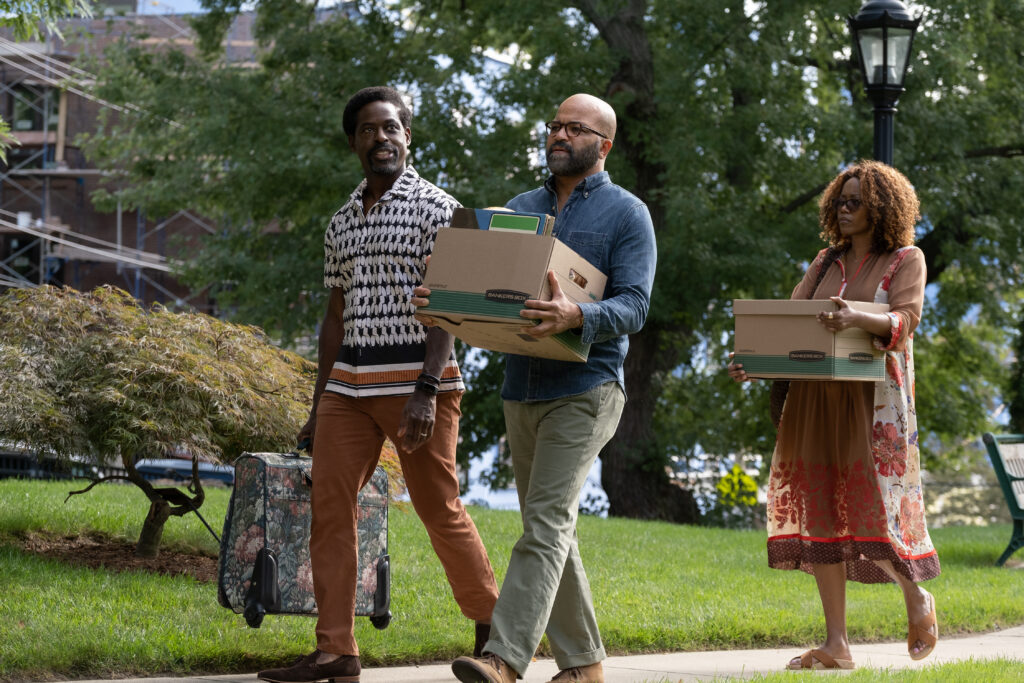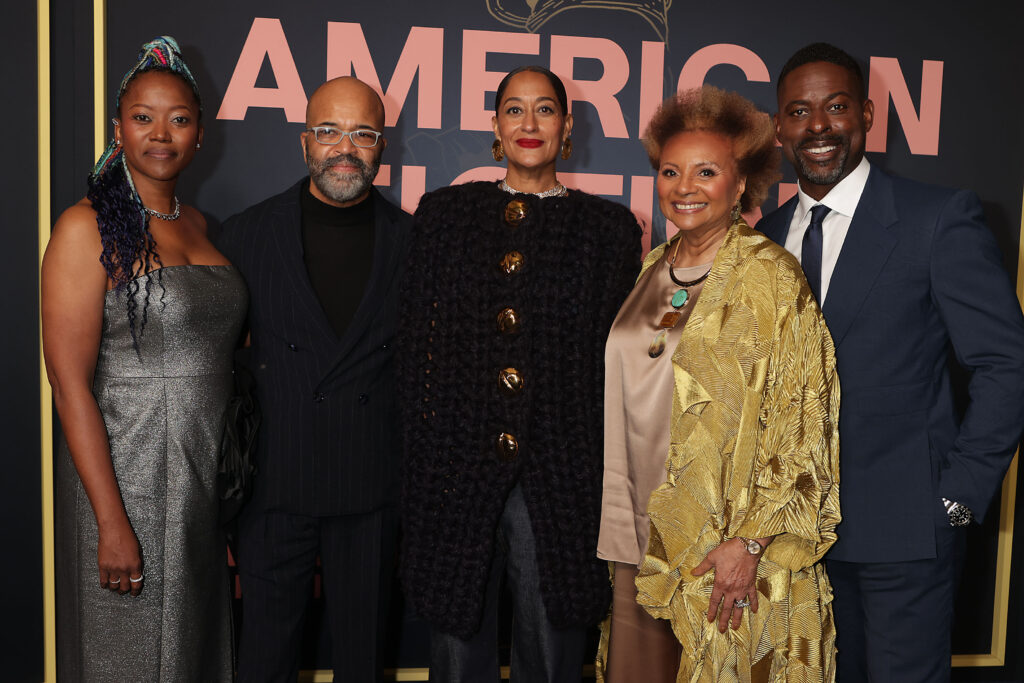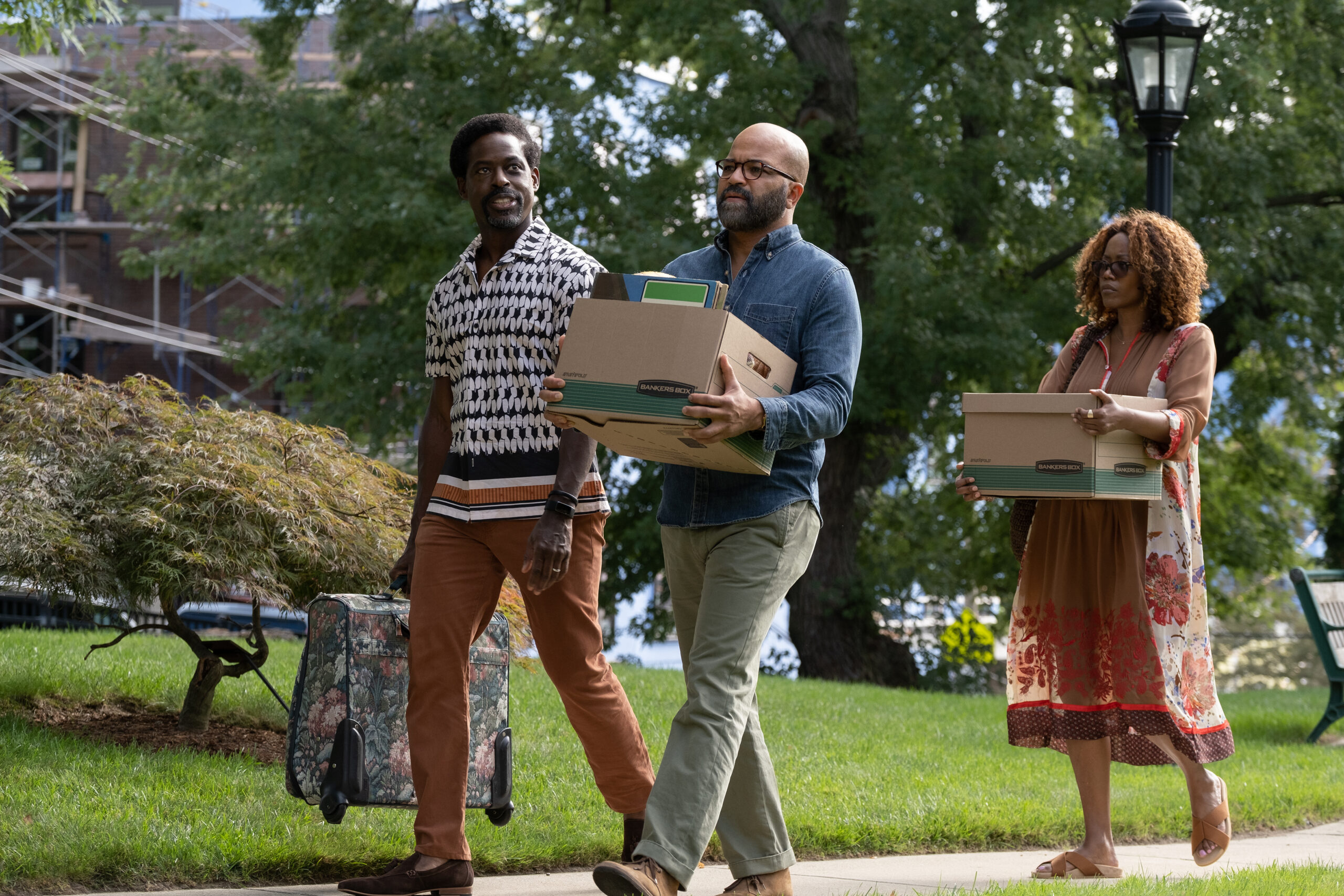When it comes to making “award-worthy” art about Black life, there’s been a consistent focus on Black people affected by poverty, crime, and/or drugs. To put it bluntly, Black trauma is often used to make money and get accolades. The comedy/drama film “American Fiction” (released Dec. 15 in theaters by Amazon MGM Studios’ Orion Pictures) is an incisively sharp satire of how Black trauma is exploited for personal and professional gain.
Writer/director/producer Cord Jefferson (who won a screenwriting Emmy for HBO’s superhero miniseries “Watchmen”) makes his directorial debut with “American Fiction,” which is based on Percival Everett’s 2001 novel “Erasure.” “American Fiction” has been getting major recognition as an awards contender, including winning the 2023 Toronto International Film Festival’s People’s Choice Award, the festival’s top prize. The movie has several nominations for Golden Globe Awards and Critics Choice Awards. “American Fiction” is also expected to get multiple Oscar nominations.

In “American Fiction,” Thelonius “Monk” Ellison (played by Jeffrey Wright) is a literature professor at a university in Los Angeles. He is a bachelor with no children. Monk is a published author, but he is having trouble finding a publisher for his most recent book, which is a contemporary re-imagining of Aeschylus’ “The Persians.” Monk deeply resents any racist mindsets that Black people can’t be part of the intellectual elite.
Monk notices with some jealousy that a new author named Sintara Golden (played by Issa Rae) has a best-selling, critically acclaimed hit with her first book, “We’s Lives in the Ghetto,” a novel about poor and uneducated Black Americans living in a crime-ridden area. Out of frustration, Monk writes a similarly themed manuscript called “My Pafology” as a bitter joke, but he doesn’t use his real name as the author. Instead, he uses the alias Stagg R. Lee and invents a story that “My Pafology” author Lee is a hardened criminal who is a fugitive from the law. Monk’s book agent Arthur (played by John Ortiz) knows about the lie and goes along.
Monk and Arthur are shocked when a major publishing company offers a $750,000 book deal for “My Pafology.” The book becomes a hit, and a Hollywood filmmaker named Wiley Valdespino (played by Adam Brody) wants to make “My Pafology” into a movie. Monk then has to decide how long he’s willing to keep up this secretive charade, knowing that the commercial success he’s experiencing has come at a cost to his integrity.
In the midst of all of these career adjustments, Monk has challenges in his personal life. A great deal of “American Fiction” takes place in the Boston area, where Monk grew up and where he spends time with his family after an unexpected event requires him to be there. His family members include his widowed mother Agnes Ellison (played by Leslie Uggams), who has Alzheimer’s disease; his younger sister Lisa Ellison (played by Tracee Ellis Ross), an obstetrician/gynecologist at a Planned Parenthood clinic; and his younger brother Clifford “Cliff” Ellison (played by Sterling K. Brown), a plastic surgeon.

Agnes has a longtime housekeeper named Lorraine (played by Myra Lucretia Taylor), who is treated like a member of the family. While Monk is in the Boston area, he has a romance with a public defender named Coraline (played by Erika Alexander), who admires Monk and his talent, even though his prickly and stubborn personality can rub some people the wrong way. Here is what Jefferson, Wright, Ross, Brown, and Alexander said when they gathered with Ortiz and Brody on Dec. 3 for a Los Angeles press conference that was webcast to invited members of the media.
Jeffrey, why did you want to be a part of “American Fiction,” and what gave you the confidence to make the movie?
Wright: Cord sent me a wonderful invitation to this project. He sent me the script and along with that a letter saying that he had read the novel and written the script and every early on heard my voice in his head as this [Monk Ellison] character.
And he also said, “And I have no Plan B.” And that was flattering. I don’t often get scripts that are designed with me in mind. And then, when I read it, the membrane between my life and that character’s life was infinitesimally thin.
It wasn’t really a matter of confidence. It was really more of a matter of necessity. I just said, “Yeah, I can tell this story. I know this man’s journey.” Particularly his relationship to his family, the necessity of becoming caretaker to [the person] who was his caretaker [his mother]. That was a very close experience that I knew probably too intimately.
There were just a number of overlaps. The script was so finely tuned—the satire, the irony. I understood the music [composer Laura Karpman’s jazz musical score for “American Fiction”]. And I hopped on board.
Tracee, why did you want to be involved in “American Fiction?”
Ross: The script was incredibly written. I was drawn in from the very first moment. Everybody says Cord is a first-time director. He’s not a first-time human. He’s just a substantial person who is incredibly intelligent. … [He] has a really clear and strong point of view which doesn’t have ego, which is a unique and special thing that lends itself beautifully to a director who gives his actors space but also knows what he wants. … Jeffrey Wright. That [casting of Wright] really got me.
Sterling and Erika, what led you to doing “American Fiction”?
Brown: What gave me the confidence to [be in “American Fiction”] was the script and the desire to put that story out there into the world. The desire to expand how the media can see us [Black people], because sometimes it has been more narrowly defined. The desire to see the banality and normalcy of people dealing with day-to-day troubles who happen to look like us.
The idea that it was written so well. I never underestimate the power of a story well-told. And the fact that it gets to be populated with people with melanin makes me really excited. And hopefully, [“American Fiction”] will make money, and then we get a chance to make more [movies like “American Fiction”].
Alexander: We need to have these conversations. I was really, really honored to be invited by Cord Jefferson, who laid out what he wanted to do and why he saw me in the role. And it’s really nice to go where you’re invited.
You don’t have to prove what you’ve done. You don’t have to convince anybody. They’ve already seen you in a place, standing next to people you admire, that you aspire to [be], and you are really rooting for in life, and hopefully, they’ve been rooting for you. That’s been my whole experience.
I’m really grateful for this [opportunity]. I love that it’s called “American Fiction,” because we’re all living in a fiction of some sort. We need to start telling more truths.
Cord, as a former journalist, you’ve talked about leaving journalism because you were being limited to doing stories about Black trauma, but you found that people wanted to put those same limitations on you in fiction screenwriting. Can you talk about what it’s like to experience these things as a Black writer?
Jefferson: It’s painful, because the implication is that Black life does not have the breadth or depth of everybody else’s life. We are defined by these five or six stories that we tell over and over again—largely about our ability to withstand pain, violence, and suffering.
Yes, I’ve had bad interactions with police officers, but it doesn’t happen that often. And when it does happen, it’s the least interesting thing that’s happened to me that day, because it says nothing about who I am as a human being. It says everything about the person who’s harassing me. These are the things that were swirling around in my mind when I picked up the novel “Erasure.”
Cord, can you talk about why you wanted to make your directorial debut to be an adaptation of “Erasure”?
Jefferson: In order to make an adaptation that feels like there’s passion to it—and not a bloodless money grab—the key is to find what you identify with in the material. There was so much in the novel that was speaking to me, it felt like, “This makes perfect sense for an adaptation from me.”
I’d never directed anything before this film. That terrified me. I’d talk to people and say, “I don’t know anything about [camera] lenses. I don’t know anything about writing. There are all these technical things I don’t understand.”
A friend said, “You just need to have a vision, and you can articulate that vision to people who understand those things.”
Understanding the material on a fundamental level is what really gave me the courage to move forward. I felt like even if I don’t know those technical things, I understand the story. I understand these people. As long as I use that as my road map, I can always go back to that in making these other decisions that I know less about. I knew this in my bones.
Jeffrey, how did making “American Fiction” affect you personally?
Wright: It is one of those wonderfully strange things that happen often when we work, when perhaps we are doing what we’re supposed to be doing. There is so much overlap between [Monk Ellison’s] life and mine, in ways I care not to divulge. How it’s changed me remains to be seen.
Erika and Jeffrey, can you talk about how Coraline and Monk’s relationship is an authentic portrayal of Black love?
Alexander: [She says jokingly] I wore some bottled butter. [She says seriously] It’s a very mature relationship. That shouldn’t be an act of resistance to see that type of thing, but it is. Jeffery is an interior guy, and so is Monk. A lot of what they do is unsaid. … I think she’s willing to take a risk on a new relationship, but he has to meet her there truthfully. And I think that matters.
Wright: Erika has so many qualities: the humor, the irony but also this strength about her that is very alluring and perfectly suited for this piece. Monk is introverted, but I liked that [Coraline] had these qualities to bring him out [of his shell]. … We had an incredible group of actors. … It was an incredible collaborative circle that Cord created for us.
What did you learn from “American Fiction” that you will carry with you for the rest of your careers?
Brown: Happiness is not a possibility unless you’re willing to live your authentic truth.
Alexander: Black showbiz gives you more. … I think the 13% of African Americans [who live in the United States] are some of the biggest cultural makers in world history. We continue to ask these important questions and put out defining pieces of work that tell a story about us and tell a story about the world.
Ross: It is better than you think to work with incredible talent.
Wright: Yes, I can interpret a script, but what I’ve gotten better at, and what I find even more critical, is finding the collaborators to work with that will allow us all to do our best work and to enjoy it. This experience [of making “American Fiction”] only reinforced that for me.








